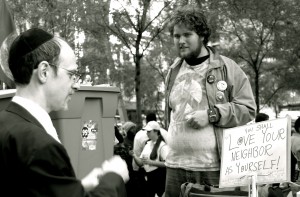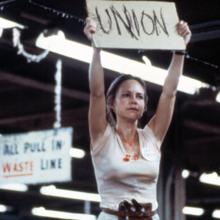pete seeger

Sharon Jones. Image via Man Alive!/Flickr
Earlier this year, Tripp Hudgins wrote a piece declaring that all his favorite theologians are dying. He listed David Bowie and Pete Seeger as two theologians whom he felt sang “real theology about a real God” during their lifetimes. Others would later add Prince and Phife Dog and Sharon Jones to their lists of songwriters who spoke lyrics of truth in a broken world and who are no longer with us. Leon Wieselthier described his friend Leonard Cohen as “the lyrical advocate of the finite and the flawed” in a beautiful eulogy in the New York Times just the other week. Could a musically gifted person of any faith be honored with better words than those?
The month of May is littered with important anniversaries in movements for justice — beginning on May 1, the day of recognition for workers and laborers everywhere. Take a listen. Got a favorite song for justice? Share below — and in the meantime, enjoy these tunes.
WHEN I MOVED out of my Sojourners magazine office in 1988, I took with me two signed review copies of books. One was Roll the Union On: A Pictorial History of the Southern Tenant Farmers’ Union. It was inscribed to me personally by H.L. Mitchell, a founder of the STFU, so I felt entitled to keep it.
The other book bore no inscription, just a simple black ink signature above the Simon & Schuster logo. It was called Carry It On! A History in Song and Picture of America’s Working Men and Women, and the co-author who signed it was Pete Seeger. I’m looking at that signature now, as I write this on the day Seeger died.
I told myself that I kept that book because I thought it might come in handy. After all, it had 11 translations of “L’Internationale” and all the words to “Solidarity Forever.” But really I kept it for the signature. I liked the idea of having something that I knew had come from the hand of someone who had ridden the rails with Woody Guthrie. Seeger was our living connection to the culture of the 1930s when, for a moment, radical dreams about a country owned and operated by its ordinary citizens seemed almost ready for prime time.
Of course, that moment passed, and those dreams were shattered by the Red Scare and the Cold War that followed. But Seeger came out on the other side with his integrity and ideals intact. Despite being honored by the last two Democratic presidents, he never renounced his radical vision of what America could be. Seeger left the Communist Party in the early 1950s and frankly acknowledged that he should have done so sooner, but he never stopped calling himself a “small c” communist. In 1994, he told The Washington Post, “Our ancestors were all socialists: You killed a deer and maybe you got the best cut, but you wouldn’t let it rot, you shared it.” Still, he was a pragmatic radical, who added that socialists should recognize that “every society has a post office and none of them is efficient. No post office anywhere invented Federal Express.”
WHEN I MOVED out of my Sojourners magazine office in 1988, I took with me two signed review copies of books. One was Roll the Union On: A Pictorial History of the Southern Tenant Farmers’ Union. It was inscribed to me personally by H.L. Mitchell, a founder of the STFU, so I felt entitled to keep it.
The other book bore no inscription, just a simple black ink signature above the Simon & Schuster logo. It was called Carry It On! A History in Song and Picture of America’s Working Men and Women, and the co-author who signed it was Pete Seeger. I’m looking at that signature now, as I write this on the day Seeger died.
I told myself that I kept that book because I thought it might come in handy. After all, it had 11 translations of “L’Internationale” and all the words to “Solidarity Forever.” But really I kept it for the signature. I liked the idea of having something that I knew had come from the hand of someone who had ridden the rails with Woody Guthrie. Seeger was our living connection to the culture of the 1930s when, for a moment, radical dreams about a country owned and operated by its ordinary citizens seemed almost ready for prime time.
Of course, that moment passed, and those dreams were shattered by the Red Scare and the Cold War that followed. But Seeger came out on the other side with his integrity and ideals intact. Despite being honored by the last two Democratic presidents, he never renounced his radical vision of what America could be. Seeger left the Communist Party in the early 1950s and frankly acknowledged that he should have done so sooner, but he never stopped calling himself a “small c” communist. In 1994, he told The Washington Post, “Our ancestors were all socialists: You killed a deer and maybe you got the best cut, but you wouldn’t let it rot, you shared it.” Still, he was a pragmatic radical, who added that socialists should recognize that “every society has a post office and none of them is efficient. No post office anywhere invented Federal Express.”
I make no secret of the fact that there is a big soft spot in my heart for the tremendous gains of the labor movement in American history and a big sad spot for how certain unions — such as those representing meatpackers and agricultural workers — have been all but decimated.
So in no particular order, here are some of my favorite pro-labor, pro-union resources for really celebrating Labor Day.
 We're in this thing together or we're not in this thing at all.
We're in this thing together or we're not in this thing at all.
We should all be marching in the streets.
We are the 100 percent.
We are poor. We are well-to-do. We are those somewhere in the middle. We are aware of the struggles and unfairness of this world and for this reason we are sensitive to one another's needs. So, we love our neighbors as ourselves.
At 92 years old, Seeger – who was joined by 60s folk singer Arlo Guthrie, and several other musicians – marched over 30 blocks in peaceful protest, ending with a variety of musical performances, one of which involved the folk hymn “We Shall Overcome,” a song Seeger helped popularize half a century earlier.


